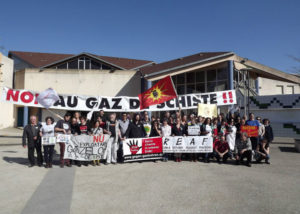By Tina Callebaut
 During my last days as an intern here at Food & Water Europe I would like to take you on a tour of the many different victories against fracking in Europe. As drilling has started in Lancashire despite opposition from local communities, it is now more important than ever to stand together in solidarity to not only halt but prevent fracking projects everywhere by banning the technique and promoting the development of clean renewable energy. Here is a run down of the current state of fracking in Europe.
During my last days as an intern here at Food & Water Europe I would like to take you on a tour of the many different victories against fracking in Europe. As drilling has started in Lancashire despite opposition from local communities, it is now more important than ever to stand together in solidarity to not only halt but prevent fracking projects everywhere by banning the technique and promoting the development of clean renewable energy. Here is a run down of the current state of fracking in Europe.
France
Let’s kick off our tour with a visit to France, where in March 2010, two exploration permits were granted for shale gas. The licenses covered in total an area of around 9.672 km². Massive protests followed, which led the Prime Minister at the time, François Fillon, to declare a moratorium on the exploration of shale gas in 2011, which prohibits the exploration and exploitation of liquid or gaseous hydrocarbons through hydrofracturing and cancels the exploration permits for projects where hydraulic fracturing would be used. France’s Constitutional Court confirmed the constitutionality of the ban and the revocation of the permits in October 2013.
Sounds great, right? Unfortunately, the law only prohibits the use of hydraulic fracturing, but does not impose a ban on the exploration or exploitation of gas through other techniques. As the technique is not clearly defined by the law, small changes and new innovations might already have the ability to circumvent this ban. However, in June 2017, the French minister of environmental transition announced that there would no longer be any permits granted for the exploration or extraction of hydrocarbons in France. Nice one, France!
Bulgaria
Now, let’s take a turn all the way to the East, to Bulgaria. The Bulgarian government granted a 5-year permit to Chevron in June 2011 for the exploration of shale gas at the Novi Pazar field. After widespread protests, the government decided in January 2012 to withdraw the permit and also decided to implement a moratorium on the use of hydraulic fracturing.
Czech Republic
Moving up and West on the map to central Europe, let’s take a peek at the Czech Republic. In 2011, Cuadrilla Morava and BasGas Energia applied to the Czech Environment Ministry for shale gas exploration licences for three sites.
The decision to award the licenses without consulting with the local government led to a series of objections from authorities and local environmentalists forcing environment minister Tomas Chalupa to cancel the licenses in April 2012 and order a review of the application, coupled with plans for a moratorium on shale gas. The moratorium was introduced in September 2012 and was valid until June 2014. Since then it has de facto continued to exist. In fact, the Czech government stated in 2016 to the European Commission: “The Government shall not allow further exploration using high-volume hydraulic fracturing or further extraction of shale gas in the Czech Republic.”
Denmark
Going all the way back to the West and North, we arrive in Denmark, which imposed a moratorium on fracking in 2012. However, licenses issued between 2010 and 2012 remained valid. French firm Total began drilling at Denmark’s first shale exploration project in May 2015 but gave up in August 2015 after failing to discover adequate deposits. Following Totals announcement, Energy and Climate Minister Lars Christian Lilleholt stated that “[a] temporary stop to new applications for shale gas has been implemented and that will continue to apply. That means that new applicants as of now cannot receive permission for new shale gas drilling.” Total’s exploration license ran until June 2016.
Ireland
Moving even further West, we arrive at our final destination for this tour: the green island of Ireland. It’s the most recent addition to this wonderful list of countries doing the right thing, or simply listening to their local communities. On the 31st of May 2017, the Irish Dáil passed a ban on onshore fracking. The historic bill was signed into law by President Michael D. Higgins on the 6th of July 2017. Well done, Ireland!
Europe Is Not for S(h)ale!
But even in countries where there is no nationwide ban, the movement to ban fracking has been very successful persuading their local governments to ban the practice in places in countries like Spain and the Netherlands.
And where no victories on a political level have been realized, there’s still no reason to give up hope. In many countries shale gas extraction has simply been halted because there’s not enough of it available in the ground to make projects economically viable, despite governments supporting the fracking industry, as was the case in Poland and Romania.
Europe is simply not for s(h)ale!


